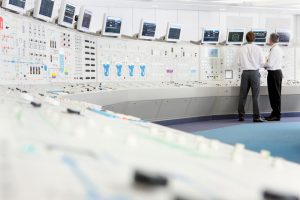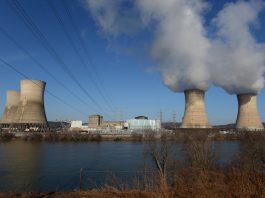Becoming a nuclear professional demands a bachelor’s degree in nuclear engineering, physics, or a related field, often complemented by a master’s degree in nuclear science and technology for specialised expertise.
Achieving Chartered Chemical Engineer status and relevant certifications further solidify the qualifications of nuclear professionals, marking professional growth through education, industry memberships, and networking is essential.
Furthermore, skills in mathematics, physics, problem-solving, regulatory compliance, engagement with professional organisations, and utilisation of industry resources are fundamental.
This article explores additional pathways and opportunities for advancement in the nuclear workforce.
Educational requirements for nuclear professionals
The educational requirements for aspiring nuclear professionals are demanding and thorough, designed to provide a strong foundation in the field.
Typically, the journey begins with a bachelor’s degree in nuclear engineering, physics, or a related discipline. This degree specialisation is crucial as it imparts the fundamental knowledge and technical training necessary for understanding the complexities of nuclear science and technology.
For those seeking to deepen their expertise, a specialised master’s degree in nuclear science and technology is highly recommended. This advanced degree not only enhances knowledge but also provides critical research opportunities that are essential for career progression.
Professional accreditation plays a noteworthy role in the career trajectory of nuclear professionals. Achieving Chartered Chemical Engineer status (MIChemE) is a prestigious qualification that signifies a high level of competence and commitment to the industry.
This accreditation is recognised globally and can markedly enhance employability and career prospects for nuclear professionals.
Continuing education is another crucial aspect of a nuclear professional’s educational journey. The nuclear industry’s dynamic nature necessitates ongoing learning to keep pace with technological advancements and regulatory changes.
Professional memberships, such as membership in the Nuclear Institute (MNucl), provide access to valuable industry resources, networking opportunities, and further educational programs. Meeting the Nuclear Delta® criteria for MNucl membership showcases a professional’s dedication to the nuclear sector and commitment to maintaining high standards in their practice.
Licenses and certifications
Possessing the appropriate educational foundation is just one aspect of building a successful career in nuclear engineering. Equally crucial are the licenses and certifications that validate a professional’s expertise and competence in this highly specialised field.
Achieving professional licensure, such as the Chartered Chemical Engineer (MIChemE) status, offers global recognition, enhancing the credibility and employability of nuclear professionals internationally.

Certifications such as an MSc in Nuclear Science and Technology are instrumental in providing the specialised skills required for career advancement. These advanced educational credentials equip professionals with in-depth knowledge and practical expertise, setting them apart in the competitive job market.
Furthermore, these certifications serve as a confirmation of a professional’s commitment to mastery in nuclear science, preparing them for more complex and higher-responsibility roles.
Additionally, membership with the Nuclear Institute, particularly as a Professional Member (MNucl), opens doors to a wealth of industry resources and networking opportunities. Being part of such an esteemed organisation ensures that professionals not only stay abreast of the latest developments in the field but also benefit from a supportive community of peers and mentors.
This membership often requires meeting the stringent Nuclear Delta® criteria, which underscore a professional’s dedication to and alignment with the nuclear industry’s highest standards.
Advanced degrees for nuclear professionals
Advanced degrees represent a noteworthy step forward for nuclear professionals aiming to deepen their expertise and enhance their career prospects.
Pursuing higher education in this field, such as a Master’s in Nuclear Science and Technology, equips individuals with advanced knowledge and specialised skills essential for navigating the intricacies of nuclear energy.
A key component of obtaining an advanced degree is the requirement for thesis writing. This rigorous process not only hones research and analytical skills but also allows students to contribute original work to the field.
Specialised research opportunities, particularly at the doctoral level, enable professionals to explore into niche areas such as nuclear physics, radiation safety, or reactor design, fostering innovation and scientific advancement.
Integrated programmes that blend undergraduate and graduate studies are increasingly popular. These programs streamline the educational journey, allowing students to achieve both degrees in a shorter time frame while gaining thorough knowledge. This approach not only saves time but also guarantees a smooth shift from foundational studies to advanced, specialised coursework.
Skill development
Building on the foundation established by advanced degrees, skill development is vital for nuclear professionals aiming to thrive in their careers.
Proficiency in mathematics and physics is necessary for practical applications in nuclear engineering. It allows professionals to design, analyse, and interpret complex systems. The ability to employ computer modelling is particularly essential, as it enables the simulation and prediction of nuclear processes, enhancing efficiency and safety.
Problem-solving techniques are at the core of a nuclear engineer’s skill set. These techniques enable professionals to address and resolve the industry’s multifaceted challenges. Being adept at identifying issues, analysing data, and formulating effective solutions is crucial. Continuous learning through workshops, seminars, and advanced degrees guarantees that nuclear engineers remain adept in contemporary problem-solving methodologies.
Effective communication strategies are equally important. Engineers must be able to convey complex technical information clearly and concisely to a variety of stakeholders, including regulatory bodies, project managers, and the public.
Regulatory compliance is another vital aspect of skill development. Knowledge of safety standards and environmental regulations is necessary to guarantee that nuclear operations adhere to legal and ethical guidelines.
This not only protects public health and the environment but also secures the continued viability of nuclear projects.
Industry networking
Cultivating strong industry networking is essential for nuclear professionals looking to advance their careers.
Effective networking strategies are important for building connections within the nuclear field, which can lead to numerous professional opportunities.
Attending industry events such as conferences, workshops, and seminars provides valuable opportunities to engage with peers, potential mentors, and employers. These gatherings are breeding grounds for insightful discussions, where knowledge sharing can result in collaborations on innovative projects.
Joining professional organisations like the Nuclear Institute significantly expands your network. Membership in such organisations not only offers access to an extensive network of industry professionals but also provides resources like specialised training, industry publications, and exclusive events.
Active participation in these organisations can also position you as a thought leader in the field, further enhancing your professional reputation and opening doors to new opportunities.
Online platforms, particularly LinkedIn, play an increasingly important role in networking. These platforms allow us to connect with professionals globally, engage in industry-specific groups, and stay updated on the latest trends and job openings.
Building a strong online presence by sharing industry insights, participating in discussions, and following key influencers can greatly enhance visibility and credibility.









